- Home
- Alex Archer
Tear of the Gods Page 2
Tear of the Gods Read online
Page 2
“At last, she arrives!”
Annja jumped in surprise; she’d been so intent on her examination of the heads that she hadn’t heard him come up behind her. Working with bog mummies was an entirely new and exciting experience for her.
Craig looked much as he did the last time she’d seen him—a bear of a man with a thick beard and a mop of unruly hair the color of pine sap. He towered over her at six and a half feet and she could have easily hidden behind his nearly three-hundred-pound body if she’d ever had the need to, but his imposing size was a complete contrast to his open and general ebullient nature.
“Now we can do some real work!” he said, a twinkle in his eyes, before crossing the space between them in that smooth gliding gait that always looked so out of character on such a large man. He wrapped her in one of his trademark hugs.
When he finally released her, and she double-checked her ribs to be certain they were all still intact, she couldn’t help but smile at him in return. One thing about working with Craig: his good humor was infectious.
“You’ve got an interesting interior decorator,” she said, nodding at the heads on the table behind her.
Her fellow archaeologist beamed. “Marvelous, aren’t they?” he said, and then stepped around her to squat in front of the center head.
“This was the first,” he said, “the one the police sent over. Isn’t it beautiful?”
His voice held a note of awe, the kind reserved for those who’ve just had some kind of religious epiphany or incredibly mind-blowing experience, and Annja almost laughed in response. She wasn’t sure that beautiful was a word she would ever use to describe a decapitated and mummified head, but it was certainly striking, she’d give him that. The victim, if that was indeed what he was, appeared to have been a male in his late twenties, maybe early thirties, with sharp cheekbones and a prominent nose. His skin had the look and appearance of well-tanned leather. His hair, still held in a ponytail with a short piece of braided rope, was a fiery orange, just short of red.
“It’s certainly something,” she replied. “I’m amazed at the level of preservation. I thought bogs were basically swamps.”
Craig nodded. “Yes and no. It depends on where they are in their development.”
He stood and faced her, doing his best to explain. “When moss dominates a low-lying section of land, the soil becomes waterlogged and acidic. Since bacteria have a difficult time surviving in such conditions, it isn’t present to break down the dead moss and other vegetation. Instead, the stuff just piles up and eventually becomes peat.”
Annja got the implication right away. “So the acidic nature of the water itself actually protects the body rather than destroying it. No bacteria means no decomposition.”
“Right,” Craig said, smiling. “And the tannins produced by the moss add an extra level of preservation, turning the skin to something like leather and keeping it from tearing in response to the pressure from above as the peat grows deeper.”
“Is that why their skin is so dark, because of the tannin?”
Craig nodded. “And why their hair is red, too.”
“You mean that lovely color isn’t natural?” she asked curiously.
“Not even close. In fact, I’m pretty sure all three of them were Romans, which means their hair was probably darker than either of ours.”
“Romans? Seriously?” She’d never heard of Romans being uncovered in a peat bog before.
“Yeah, I know, it’s unusual to say the least. But it’s hard to argue with the evidence. Here, look.” Moving to the head on the right, he reached out and turned the frame around, pointing at something on the back of the man’s skull.
At first Annja couldn’t figure out what it was, but after staring at it for a minute and mentally smoothing out the skin while doing so, she finally got it.
“It’s a tattoo, isn’t it?”
Craig’s eyes twinkled. “Yes, but a tattoo of what?”
Annja leaned in closer, trying to puzzle it out. “It’s an animal of some kind, I think. A dog, maybe? Or a wolf?”
“Close,” he replied. “Look at its mouth. See anything unusual?”
She peered at it harder, trying to sort out the details of the tattoo from the natural lines of the aged flesh. It looked like…
“Is that a tusk?” she asked without looking up.
“Right! Which makes that,” he said, pointing at the tattoo, “a wild boar.”
He beamed at her, as if the presence of the boar explained everything. But Annja wasn’t seeing the connection.
“Okay, so it’s a boar and not a wolf. So what? I still don’t see why that makes him a Roman rather than a Celt.”
Craig led her across the tent to where another table held two laptop computers and a combination printer/scanner. He sorted through a stack of papers next to one of the laptops until he found the page he was looking for and then handed it to Annja without a word.
She found herself looking at a scanned image of a battle standard photographed from a museum collection somewhere. She could even see the edge of the glass box in which it was housed. But what really caught her eye was the image of the charging boar that dominated the center of the standard. It was the exact same design that was tattooed on the back of the bog mummy’s head.
“XIV Gemina, or the Fourteenth Legion,” Craig said. “Under the command of Gaius Suetonius Paulinus, it was ordered back to Britannia by the emperor in A.D. 67 to quell the Boudican rebellion.”
Boudica was the warrior queen of the Iceni clan, Annja knew. She’d inspired and led one of the largest uprisings against Roman rule in the history of the empire. The Roman historian Cassius Dio wrote that she was “most tall, in appearance most terrifying, in the glance of her eye most fierce”—a description that made Annja smile the first time she’d read it. Annja’d been called fierce once or twice in her day, too.
She had to give Craig credit; it was a nice piece of detective work. But it raised more than a question or two in her mind. “I thought Boudica made her stand near Mancetter?” That was at least fifty miles south of where they now stood.
“She did. And that’s where the story ends for most historians. But there’s a small group, myself included, that believe a portion of her army escaped the battle that day and tried to make it to Anglesey by cutting overland across the moors. If they had, and if Paulinus pursued them as I believe that he did, then it’s not inconceivable that they met again in battle and that we’ve stumbled on evidence of that very encounter. If you examine—”
Craig’s explanation was cut short by the sound of running feet. He and Annja turned to face the entrance just as the flap was thrown open and Zeke stuck his head in through the opening.
“Dr. Stevens!” he cried, his voice full of excitement. “We’ve got another one!”
3
After delivering his message, Zeke turned and took off at a run back across the camp. Annja made as if to follow, but then hesitated. Given his size, there was no way Craig would be able to match the younger man’s pace.
He must have guessed what she was thinking, for he waved a hand at her in dismissal. “Go on! Quickly, before he’s out of sight. I’ll meet you at the excavation,” he said with a chuckle.
That was all she needed to hear. Annja was five feet ten inches tall, with chestnut hair and amber-green eyes. She had an athlete’s build, with smooth, rounded muscles and curves in all the right places, and it took her only a moment or two to sprint along until she had the eager grad student back in her sights.
She kept her eye on Zeke as he left the camp behind and moved at a quick pace through the trees for about a hundred yards, following a path worn into the earth from the passage of the dig team over the past several days. Ten minutes later Anna emerged from the trees to find herself standing on the gentle slope of a small hill, the dig site laid out before her.
The site was roughly half the size of a football field and was located in a hollow between several small hills like the
one she stood on. There were two significant features that set this particular valley off from dozens of others in the nearby area. The first was a large rock cairn that had been erected at the base of the slope on which she stood, its stone face now overgrown with moss and lichen but still recognizable for what it had once been. The second was the skeletal remains of an ancient oak tree standing near the middle of the site, a jagged black scar of a lightning strike clearly visible even from a distance.
Although Craig’s team had only been here a short while, Annja could see that they’d been busy. A grid had been laid out on the valley floor in colored string, dividing the space into individual sections that Annja knew from experience were roughly two feet square. Work had begun in several sections, with the top layer of the peat removed, revealing the rich substrata beneath. Sifting stations had been set up beneath canopies to the right of the grid and there was a plethora of shovels, rakes and handheld trowels scattered about.
Most of the team was clustered around a single grid square, obviously the location of their most recent find. Annja made her way down the hill and across the dig site to join them.
The smell hit her as she moved closer, the unmistakable scent of scorched earth that accompanied a peat bog of any decent age. She resisted the urge to cover her nose; the human body only recognized an odor in the first few minutes of contact, after that it was as if it didn’t exist.
Two grad students were on their hands and knees near the corner of the grid, using hand tools to clear the debris away from the blackened face that was peeking out of the peat. While this one wasn’t as well preserved as the others, the similarities were still obvious. It was clear that the four men had the same ethnic background; the prominent nose and high cheekbones were as easy to see in this specimen as they were in the others. And like the others, this head had been severed and lay by itself in the peat that preserved it.
Who were they? Annja found herself wondering. And what happened to their bodies?
It was mysteries like these that had helped her fall in love with archaeology in the first place. She couldn’t wait to get her hands dirty.
Craig finally caught up with them then, his face red and his chest heaving from his hike through the woods, but it did nothing to stem his enthusiasm for what they’d uncovered. Being the excellent teacher that he was, Craig let his people continue unearthing the find, guiding them with encouraging comments here and there rather than taking control of the process for himself as Annja knew others she’d worked with in the past would have done. It was what made Craig such a good student of archaeology; he cared more about the artifact and what it could tell them than the academic reputation associated with whoever unearthed it.
For the next two hours Annja lost herself in the simple joy of doing what she loved, helping Craig and his students excavate the mummified head from the peat surrounding it and then carefully packing it into a foam-lined carrying case for transport back to the campsite for further examination. Several of the students recognized her from Chasing History’s Monsters and it wasn’t long before she was surrounded by a small group of her own, dispensing advice and stories of former digs just as Craig was doing with the others a few yards away. It was such a welcome relief from the recent craziness in her life that Annja found herself relaxing for the first time in weeks and enjoying the simple pleasure that came from doing something you loved in the presence of others who felt the same way.
By the time dusk fell over the campsite, Annja felt like she’d been working with the team for weeks.
“Not a bad first day, huh?” Craig asked her as they helped the others cover the site with tarps to protect it in case of rain later that evening.
“It was wonderful, Craig. Truly,” she said with a smile. “Thanks for inviting me.”
He grinned. “Don’t thank me yet. You haven’t tasted what passes for cooking around here.”
Once they were finished at the dig site, Annja was introduced to Sheila James, a fellow American, who gave her a tour of the camp, showed her the tent she’d be using for the duration and introduced her to some more of the students over dinner that night.
Worn out from the hard work and the lingering effects of the jet lag, she thanked them all for their hospitality and headed off to bed.
Annja found herself walking in the woods beneath the silvery light of a full moon, though she knew she was not herself. The hand at the end of her arm was decidedly male. She was part of a group of four warriors carrying the body of a fifth on a funeral bier made of wood, fashioned together with rope and vines. Around her came a host of others, warriors mainly, but some women were scattered amid the company here and there, as well—all of them moving through the trees in a long, snaking procession. Torches threw flickering light across the scene, highlighting the faces of those around her, revealing the geometric designs painted on their faces in blue woad—whirls and spirals and circles that interlinked and crossed one another so that it was difficult to discern where one ended and the next began.
The body on the bier was that of a tall warrior with long red hair. He was dressed as he’d been when he’d fallen on the battlefield, his tunic and mail stained with blood, both his own and that of his enemies. His arms were folded across his chest, his hands grasping the hilt of the sword that he’d carried into battle, the blade broken off halfway down its length.
Annja’s eyes were drawn to the necklace of gleaming black the dead man wore around his neck. It was made from a substance that she couldn’t identify, at least not from this distance, and it reacted to the light the same way an oil spill does, reflecting myriad colors back at the viewer. She felt the need to reach out and touch it….
The moonlight suddenly grew brighter, breaking her reverie, and she looked up as the group emerged from the trees into the open. They stood upon the crest of a hill that sloped gently downward until it met the edge of a wide marshland. A spit of land jutted out into the bog for a short distance and a white robed druid stood upon it, waiting for them. Behind him a massive oak tree rose out of the depths of the bog, its branches spread wide, forming a living canopy over that part of the swamp.
The procession descended the hill. When they reached the narrow spit of land, the rest of the group came to a halt while Annja and the other pallbearers continued forward. The druid directed them to place the bier on the ground at his feet. They did so and then, as a group, stepped off to one side to wait for further instructions.
The druid raised his hands to the sky and began to chant in a deep voice, his words rolling out across the night air. The words were spoken in a language Annja didn’t understand—Welsh or Gaelic or some derivative thereof—but she was familiar enough with ancient burial ceremonies that she knew the general gist of it. The druid was asking for the blessing of the four elements and calling upon the gods to look with favor upon the one they were committing into their care that night.
When the chant was finished, four male prisoners were led forward from the rear of the procession. They were naked and bound at the wrists with thick hemp ropes. Their movements were sluggish, their expressions unfocused, and it was clear to Annja that they’d been drugged.
She understood why a moment later, when the first of them was made to kneel at the edge of the bog with his head resting sideways on the stump of a tree Annja hadn’t noticed before now. The man’s eyes roamed over them, seeing but not seeing, and the real Annja breathed a sigh of relief when it was clear that he didn’t understand what was to come. As if on cue, the druid approached the prisoner, a gleaming sickle-shaped blade in his hands. There was another chant, this one much shorter in length, and then that blade rose and fell in one swift, sure motion.
The druid turned to face the procession, the Roman’s severed head held aloft by the tangle of its own hair, and at the sight of it a shout went up from the rest of the onlookers. Inhabiting a body not her own, Annja found herself shouting along with the rest of them.
The cry was repeated three times—a ritu
al response, Annja realized—and then the druid turned to face the dark waters at his back. Another prayer flowed forth, a request to Arawn, god of the underworld, to accept the blood offering they were making on behalf of their slain chieftain, most likely, and then the slain prisoner’s head was flung outward into the night.
Annja heard the splash as it hit the water and watched as the bog swiftly sucked it out of sight.
The first prisoner’s body was dragged away and the second victim was brought forward. The ceremony was repeated, and then twice more with the final two victims. The stink of blood filled Annja’s nostrils by the time the druid was finished, so thick that she could almost taste it on the back of her tongue.
At a sign from the druid, she and the other pallbearers hefted the bier back up again. Following the druid, they marched out into the bog.
Much to her surprise the bog did not swallow them whole. Her feet instead found the hard surfaces of stones laid just beneath the waterline, a hidden walkway extending out across the marsh to the base of the sacred oak. They carefully placed the bier under the tree’s sheltering boughs and returned to the shoreline.
Annja and the rest of the pallbearers rejoined the main procession, leaving the druid standing alone on the small strip of land where the ceremony had taken place. As she watched, the high priest raised his arms toward the heavens and shouted in a voice full of power.
In the sky above him, thunder raged and lightning cracked, answering his call as the funeral bier of the last of the Iceni chieftains sank toward the bog’s heart.
ANNJA AWOKE WITH a start. Lightning flashed, lighting up the sides of her tent for a moment before the darkness returned to smother the camp in its embrace.
Just a dream, she told herself. Just a dream.

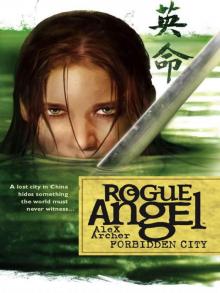 Rogue Angel: Forbidden City
Rogue Angel: Forbidden City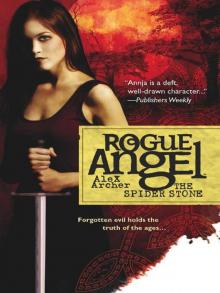 The Spider Stone
The Spider Stone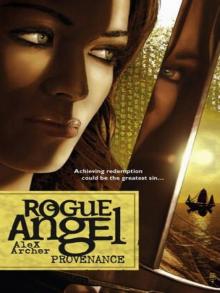 Provenance
Provenance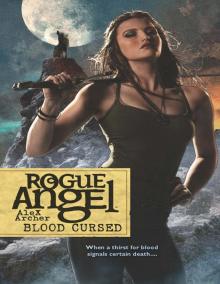 Blood Cursed
Blood Cursed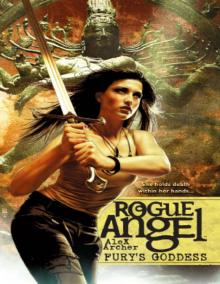 Fury's Goddess
Fury's Goddess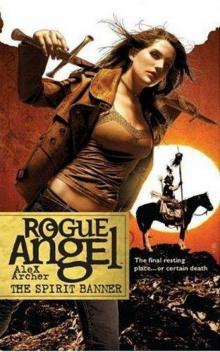 The Spirit Banner
The Spirit Banner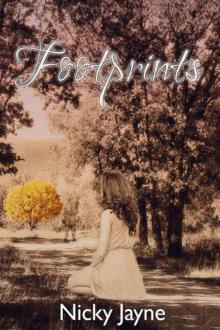 Footprints
Footprints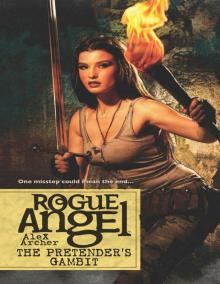 The Pretender's Gambit
The Pretender's Gambit Rogue Angel: The Lost Scrolls
Rogue Angel: The Lost Scrolls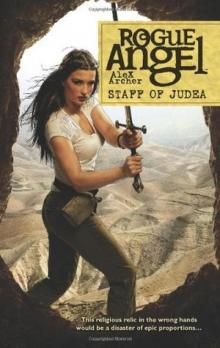 Staff of Judea
Staff of Judea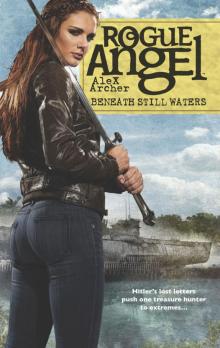 Rogue Angel 55: Beneath Still Waters
Rogue Angel 55: Beneath Still Waters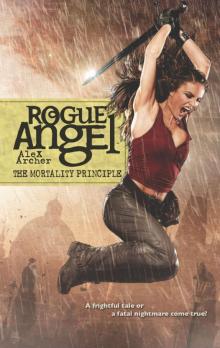 The Mortality Principle
The Mortality Principle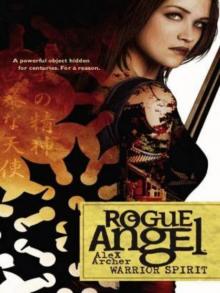 Warrior Spirit
Warrior Spirit Paradox
Paradox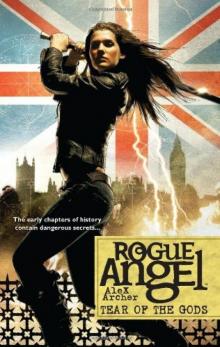 Tear of the Gods
Tear of the Gods Forbidden City
Forbidden City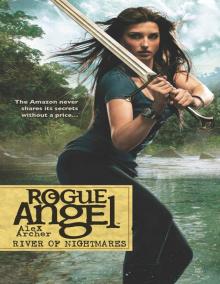 River of Nightmares (Rogue Angel)
River of Nightmares (Rogue Angel)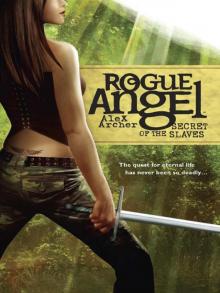 Rogue Angel: The Secret of the Slaves
Rogue Angel: The Secret of the Slaves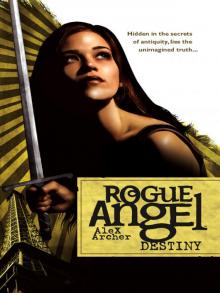 Destiny
Destiny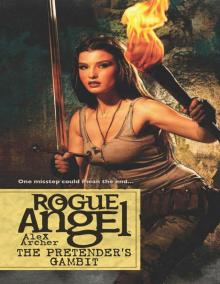 Rogue Angel 51: The Pretender's Gambit
Rogue Angel 51: The Pretender's Gambit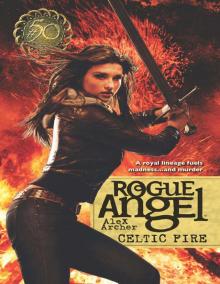 Celtic Fire
Celtic Fire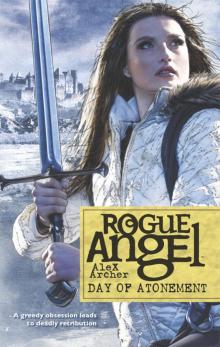 Rogue Angel 54: Day of Atonement
Rogue Angel 54: Day of Atonement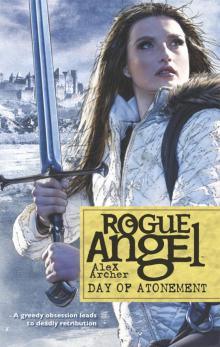 Day of Atonement
Day of Atonement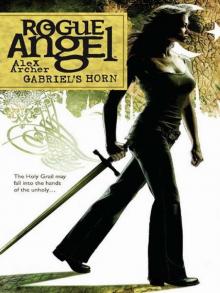 Rogue Angel: Gabriel's Horn
Rogue Angel: Gabriel's Horn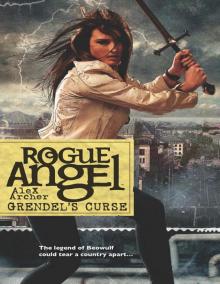 Grendel's Curse
Grendel's Curse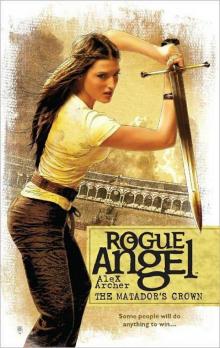 The Matador's Crown
The Matador's Crown Rogue Angel: The Chosen
Rogue Angel: The Chosen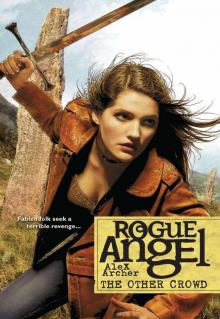 The Other Crowd
The Other Crowd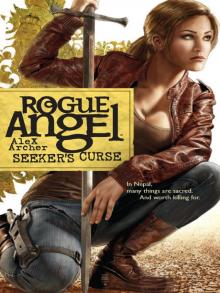 Seeker’s Curse
Seeker’s Curse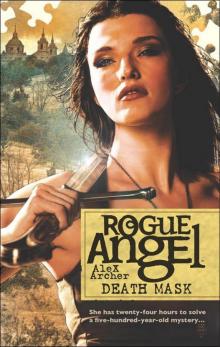 Rogue Angel 52: Death Mask
Rogue Angel 52: Death Mask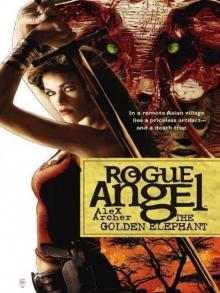 The Golden Elephant
The Golden Elephant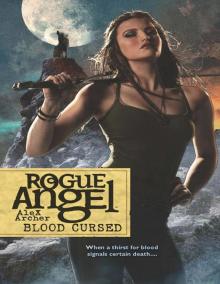 Blood Cursed (Rogue Angel)
Blood Cursed (Rogue Angel)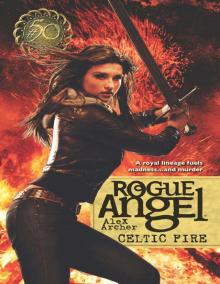 Celtic Fire (Rogue Angel)
Celtic Fire (Rogue Angel)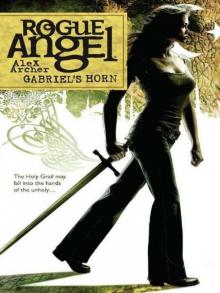 Gabriel's Horn
Gabriel's Horn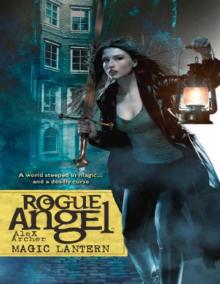 Magic Lantern (Rogue Angel)
Magic Lantern (Rogue Angel)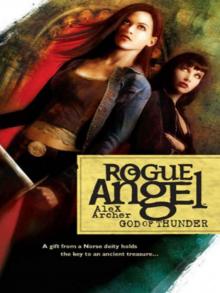 God of Thunder
God of Thunder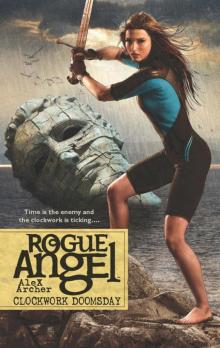 Clockwork Doomsday
Clockwork Doomsday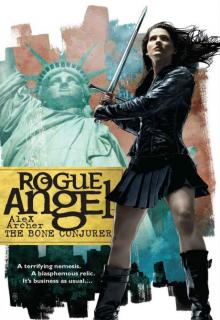 The Bone Conjurer
The Bone Conjurer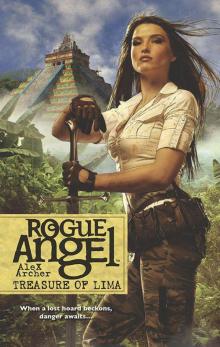 Treasure of Lima
Treasure of Lima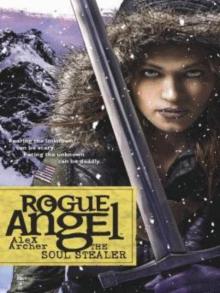 The Soul Stealer
The Soul Stealer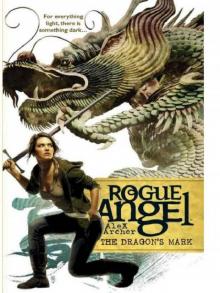 The Dragon’s Mark
The Dragon’s Mark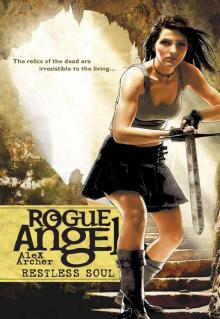 Restless Soul
Restless Soul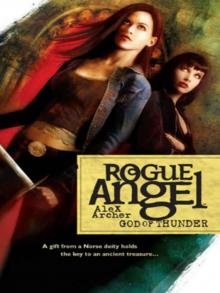 Rogue Angel: God Of Thunder
Rogue Angel: God Of Thunder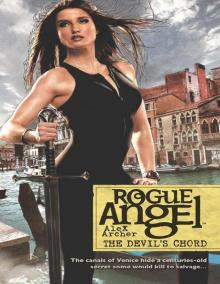 Rogue Angel 49: The Devil's Chord
Rogue Angel 49: The Devil's Chord Death Mask
Death Mask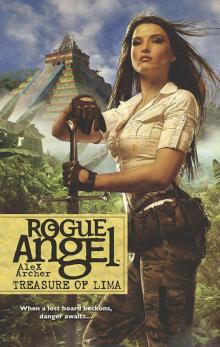 Rogue Angel 46: Treasure of Lima
Rogue Angel 46: Treasure of Lima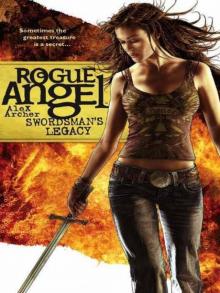 Swordsman's Legacy
Swordsman's Legacy The Oracle's Message
The Oracle's Message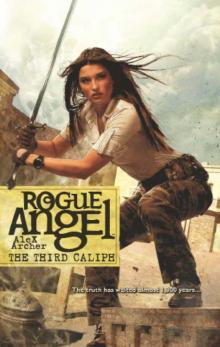 The Third Caliph
The Third Caliph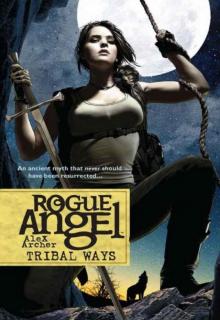 Tribal Ways
Tribal Ways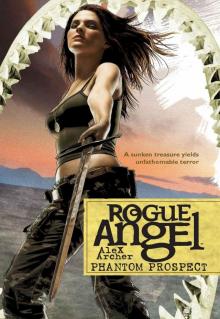 Phantom Prospect
Phantom Prospect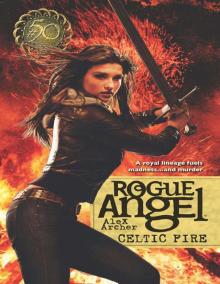 Rogue Angel 50: Celtic Fire
Rogue Angel 50: Celtic Fire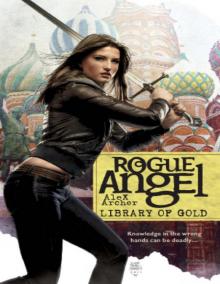 Library of Gold
Library of Gold Rogue Angel 53: Bathed in Blood
Rogue Angel 53: Bathed in Blood Sacred Ground
Sacred Ground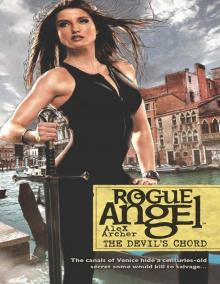 The Devil's Chord
The Devil's Chord Serpent's Kiss
Serpent's Kiss The Vanishing Tribe
The Vanishing Tribe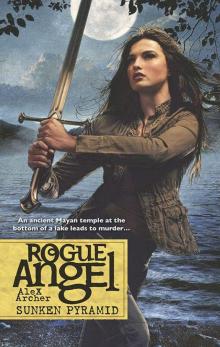 Sunken Pyramid
Sunken Pyramid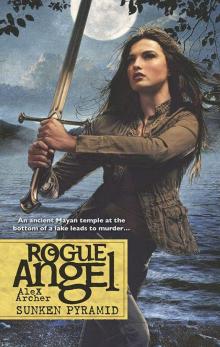 Sunken Pyramid (Rogue Angel)
Sunken Pyramid (Rogue Angel)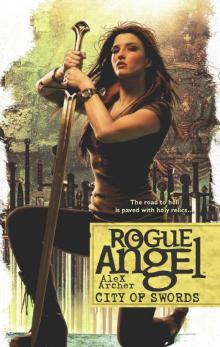 City of Swords
City of Swords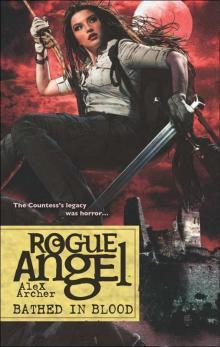 Bathed in Blood
Bathed in Blood The Lost Scrolls
The Lost Scrolls The Babel Codex
The Babel Codex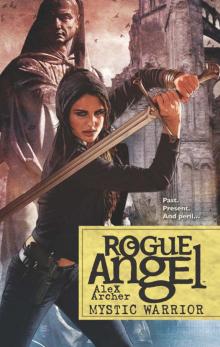 Mystic Warrior
Mystic Warrior Eternal Journey
Eternal Journey Beneath Still Waters
Beneath Still Waters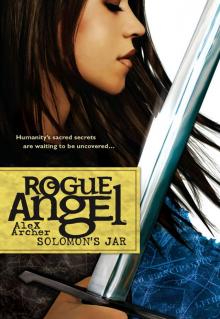 Solomon's Jar
Solomon's Jar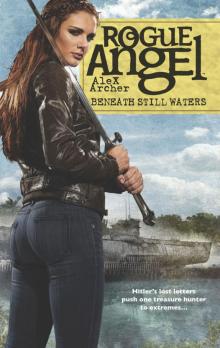 Beneath Still Waters (Rogue Angel Book 55)
Beneath Still Waters (Rogue Angel Book 55) Cradle of Solitude
Cradle of Solitude Secret of the Slaves
Secret of the Slaves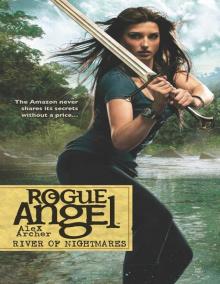 River of Nightmares
River of Nightmares Polar Quest
Polar Quest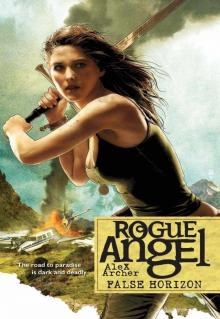 False Horizon
False Horizon